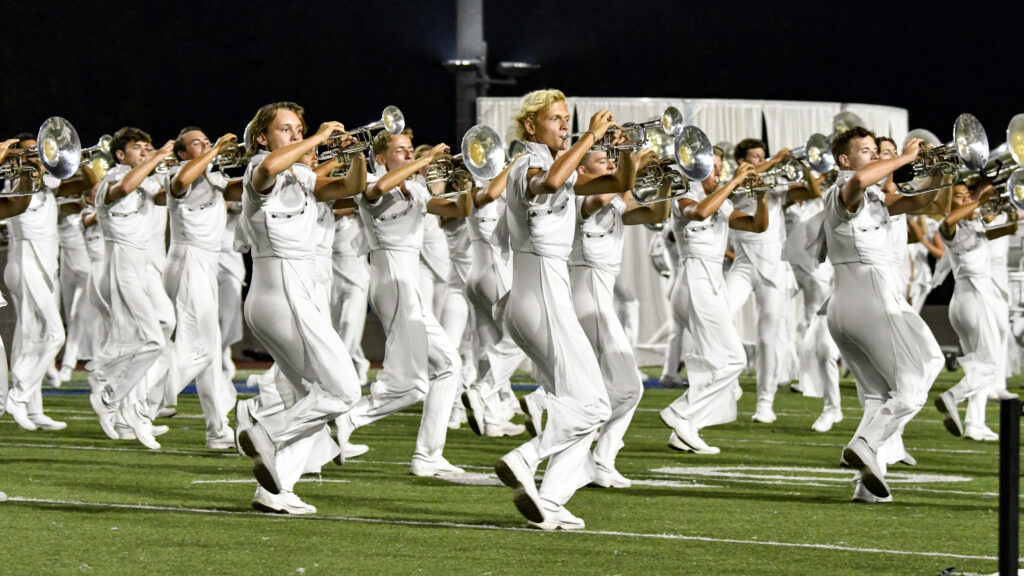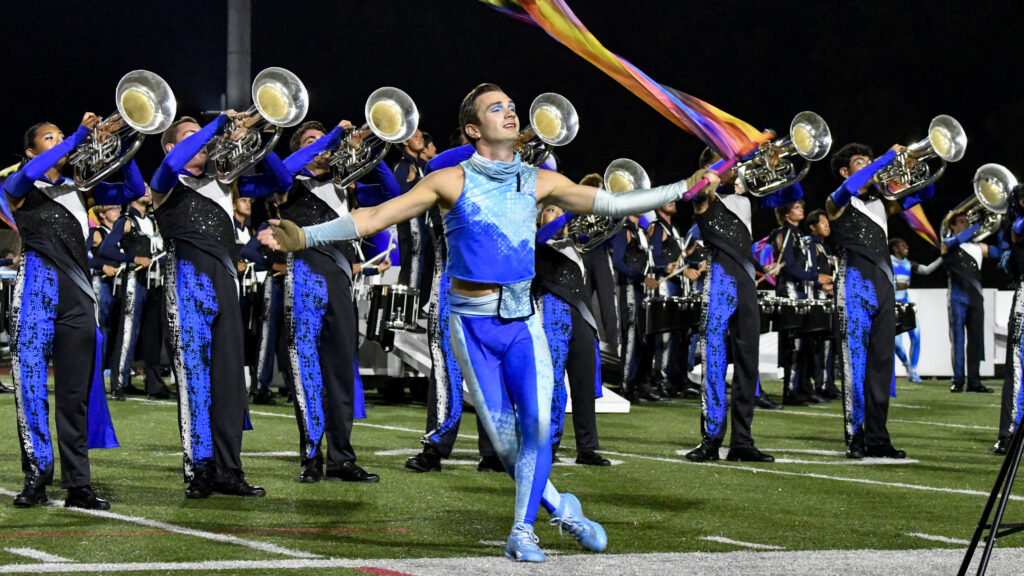The 2004 Drum Corps International World Championship was held at Denver’s INVESCO Field at Mile High, since renamed Sports Authority Field.
Among non-finalist corps, the 13th place Spirit from Jacksonville State University missed the Finals competition by scoring just 0.075 under Glassmen in the Semifinals, followed by Capital Regiment, Seattle Cascades, Colts, and Magic of Orlando.
As only 17 corps advanced into the Semifinals from Quarterfinals, Southwind missed out on advancing into the Friday show by finishing 18th in Quarterfinals, 0.450 points under Magic of Orlando. The big Thursday show was named Quarterfinals and not Prelims, as it is today. Open Class corps didn’t yet advance to perform with the World Class corps, competing solely with corps in their own class.
With “From the Heartland,” the 16th-place Colts evoked the spirit of the American Midwest, the Dubuque, Iowa corps’ home.

The show opened with Joseph Wilcox Jenkins’ “American Overture for Band,” written in 1953. The entire opener celebrated the wholesomeness of the nation’s heartland in its uninhibited exuberance.
Vast open spaces of land were hinted at in the earth tones of the color guard’s costumes, offset by the celebratory bright red, yellow, and light brown of the flags. Just as the French horns carried the work in its original form, the mellophones pulled double duty on the field throughout the piece.
The Industrial Revolution came to the Midwest in a medley of two Aaron Copland works. “John Henry” was originally written in 1940 for the weekly half-hour CBS radio series. John Henry, proclaimed a “steel-driving man” in a popular folk song, is claimed to have been a real person despite the tall-tale nature of the original story. Copland took a programmatic approach to his piece, simulating sounds of a train and John Henry’s sledgehammer.

The Colts opened the piece with a snippet of the melody of the folksong known to many, played by solo mellophone and baritone horns. The percussion slowly accelerated while playing a long series of 16th notes that sounded like a steam train picking up speed.
The pastoral nature of the Heartland’s farms was heard in Copland’s “Threshing Machines,” written for the 1939 feature film, “Of Mice and Men,” based on a 1937 book by novelist John Steinbeck about migrant workers during the Great Depression. As the piece wound down, a repetitive single pitch played on a chime re-created the sound of a railroad crossing warning bell.
The next selection, “Ol’ Man River,” came from Jerome Kern’s smash musical, “Show Boat,” written in a five-tone pentatonic scale, not unlike much of the music of Southeast Asia. Being that Colts’ hometown of Dubuque sits on the banks of the great Mississippi River, the corps’ staff considered the timelessness of the flowing river to be a metaphor for the long-term existence for the corps itself.

This piece was played with great restraint, allowing the tenderness of the work to gently build up intensity to when the color guard members took up large flags of strips of blue, white, and purple that represented waves on the river. A lone balletic dancer in blue further referenced the reflective hue of the water.
The corps’ closing tune was Robert Russell Bennett’s “Celebration,” the third and final movement of his 1957 “Symphonic Songs for Band.” Bennett wrote, “The work ends with a bright celebration reminiscent of a country fair. Instruments evoke the sounds of the calliope and birdsong.”
Flags of swatches of yellow, green, blue, and deep red enhanced the slightly silly composition as an ensemble of nine horns played a short feature while alternately dipping down with legs bent like a Charlie Chaplain dance routine. Flags turned the solid red of the horn line and percussionists’ jackets, with the corps ending the show with a reprise of “Old Man River.”

Michael Boo was a member of the Cavaliers from 1975-1977. He wrote about the drum corps activity for more than 35 years while serving as a staff writer for various Drum Corps International projects. During his lifetime Boo wrote for numerous other publications including an honors-winning book on the history of figure skating. He also was an accomplished composer. Boo passed away in 2020 and was inducted into the DCI Hall of Fame posthumously in 2021.





